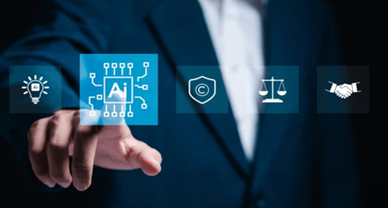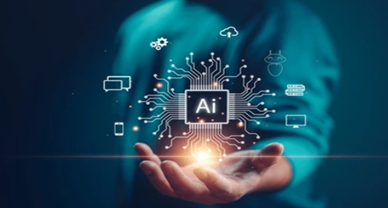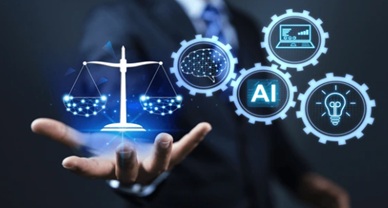The Legal Conundrum of AI as a Patent Holder: Affecting the Policy Decisions
Introduction
As artificial intelligence continues to gain momentum in various industries, the question of whether artificial intelligence can be a patent owner has become increasingly relevant. The owner gets an exclusive right to use or sell for a specific time period as a legal right under the document which we refer throughout this paper as ‘patent’. The patent system is designed to encourage innovation by protecting the rights of inventors to their inventions.
The Issue
The Indian Patent Office, has for the first time rejected to recognize the claim of AI to be an inventor relying upon Section 2 and 6 of the Indian Patents Act, 1970 (Hereinafter, the Act).[1]
Legal personality refers to the ability of an entity to hold legal rights and obligations. Under current patent law, only a human inventor or a company employing human inventors can be granted legal personality and own a patent.[2] However, some argue that AI systems should be granted legal personality and be allowed to own patents. They argue that AI systems have become more intelligent and capable of creating novel and non-obvious inventions, and therefore should be granted the same rights and protections as human inventors.
[Image Sources : Shutterstock]
In India, the Indian Patent Act, 1970 protects the individual ideas and lays down the rules and regulations for all the matters dealing with the Intellectual Property Rights and related. As been discussed earlier, the growth in the technologies has made it possible that even AI can generate new ideas and worthy enough to get patents. However, the main issue lies here is that whether or not the law recognizes for the same or whether or not the law recognizes an AI as an inventor. It is noteworthy to mention at this juncture that, the Indian Patents Act does in no way define the term ‘inventor’ although as has been said before, it is the general presumption that an inventor can be an individual or company. Hence, it seems necessary for us to uncover the uncertainty which comes with the undefined term ‘inventor’ and understand what can be done in the Indian legal context.
Indian Position: Going through the Statutory Interpretation
Both Section 2 and 6 of the Indian Patents Act recognize an inventor and who can apply for the patent in India, basically ‘persons’ shall be able to apply for the patent. Section 2(1)(s) includes the government as well apart from other ‘natural persons’ although it did not define the term ‘person’ with clarity. Section 2(1)(y) defines who the first and true inventors are not. Section 6(1)(a) lays down the provision that, any ‘person’ can make an application of the patent for an invention if that person is a ‘first and true inventor’ of the said invention.[3]
In the case of V.B. Mohammaed Ibrahim v. Alfred Schafranek, hon’ble court has held that neither a ‘financing partner’ nor a ‘corporation’ can be the ‘sole’ applicant for the claim of the inventor.[4] What this judgement even in 1960 entails that only a ‘natural person’ can invent by contributing through its skill or technical knowledge and that use of the skill of the natural person shall be qualified for the claim of the inventorship under the Act. Moreover, a bare reading of the provisions as has been cited above indicates that the act when formulated intended a patent holder to be the natural person who is ‘true and first to invent’ through their knowledge or skill or technical knowledge.
However, the judgement discussed above should be read with a Supreme Court order dated 1981. Hon’ble court has clarified the position of or to say, the qualification of a ‘legal person’ which has been enumerated in India. The court has ruled that the term ‘personality’ can be solely attributed to the legal person.[5] Such a ‘personality’ entails a right to sue or be sued by another entity which an AI lacks. A person can have the moral right may not have the legal right in the invention. However, currently, AI has not reached the stage where it can be sued or can sue. It is the owner of the property (in our case AI) who can be sued and can sue.
Furthermore, the Ayyangar Committee report of 1959 on the Indian Patents Act has said that the inventor, as has been mentioned in the Indian Patent Act or the intent of the legislators, has a right to be an inventor.[6] They might sell their ownership interest as per the contract, but they shall have the right to retain their ‘moral right’. An AI cannot have a moral right as has been discussed by the Ayyangar Committee, at least not in the present legal scenario governing the AI regulations. Hence, it can be said that the current Indian regime is not in the favour of granting AI a patent license.
Response from other Jurisdictions
In a recent, two patent applications has been filed by Stephen Thaler who has named an AI system as DABUS (or “Device for the Autonomous Bootstrapping of Unified Sentience”) for the inventorship tag. However, the Federal Appeals Court last year said no to such a request in a case titled Thaler v. Vidal. While dismissing the claim, the court has said that while it may seem, while resolving the claim, that there is a requirement of “an abstract inquiry into the nature of invention or the rights, if any, of AI systems,” however, there is nothing to “ponder these metaphysical matters.” Rather, the court has relied on the ‘statutory interpretation’ of the term “inventor”. The Federal Court has concluded that while passing the Patent Act, the Congress has intended only the natural person to be as an inventor hence AI does not count in as a ‘natural person’.
The Companies and Intellectual Properties Commission (CIPC), however, has allowed the patent listing to the inventor as DABUS in 2021. However, it can be said that South Africa differs from other jurisdictions or in particular India as they do not have a ‘substantive patent examination system’ which is used by the government to evaluate the merits of a patent application.
Even the patent applications in UK, Australia, and Europe have been denied based on the same ground of ‘personhood’.[7]
Way ahead?
This section will not determine what can be done to solve this problem but the effort is to provide some possible solutions as has been discussed across.
As it has been noticed that the courts worldwide are trying to read the patent laws as they are currently written and not taking into note the development in the technology and the way law can be tweaked due to he technological innovations which raises a policy question as well.
As a policy question, it can be said that, the non-granting of patent can restrict the incentives to the innovations. This will undermine the core aim of the patent system of providing incentive in a time-bound manner. For an example, what if some AI can manufacture certain medicine which no one can? This will only disincentivize the pharmaceutical researchers to research more. A second policy questions can also be raised that; AI should not be the patent holder as this will not help the natural person in any way for their inventorship as a machine can any way be more innovative if fed with the data which a natural person might take time to consume. However, a policy solution can be that the natural person before that innovation can be granted such patent. Consequently, this also raises few questions which due to the paucity of words, the author will not be able deliberate upon.
In conclusion, it can be said that there is an upshot in the AI system worldwide in creating the number of innovations in the coming years. The patent systems need to accept this reality and chalk out the plan for this new reality to be accommodated in the policy questions.
Author: Mayank Kumar, NALSAR University of Law, Hyderabad, in case of any queries please contact/write back to us at support@ipandlegalfilings.com or IP & Legal Filing.
[1] Archana Raghavendra, Does AI Qualify as an ‘Inventor’ based the Statute in Indian Patents Act, 1970?, Mondaq, Jan. 05, 2022, https://www.mondaq.com/india/patent/1147320/does-ai-qualify-as-an-inventor-based-the-statute-in-indian-patents-act-1970.
[2] Natalie Shoolman & Rose Jenkins, Only Humans are Inventors under the Patents Act, But for How Long? Kluwer IP Law, May 11, 2022, https://patentblog.kluweriplaw.com/2022/05/11/only-humans-are-inventors-under-the-patents-act-but-for-how-long/#:~:text=The%20Full%20Court%20also%20held,to%20be%20a%20natural%20person.
[3] Section 6, the Patents Act, 1970.
[4] AIR 1960 Mysore 173.
[5] Som Prakash Rekhi vs Union of India & Anr, AIR 1981 SC 212.
[6] Shri Justice N. Rajagopala Ayyangar, Report on the Revision of the Patents Law, 1989, https://ipindia.gov.in/writereaddata/Portal/Images/pdf/1959-_Justice_N_R_Ayyangar_committee_report.pdf.
[7] Amar Diwakar, Can an invention enabled by artificial intelligence be patented?, TRT World, Aug. 30, 2022, https://www.trtworld.com/magazine/can-an-invention-enabled-by-artificial-intelligence-be-patented-60299.



